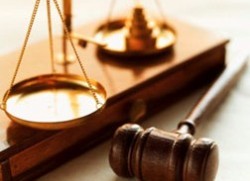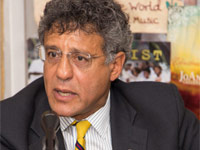
NASSAU, The Bahamas — Justice and National Security officials in The Bahamas are hailing the use of live, video-linked testimony in a criminal case in the Supreme Court this week as a “landmark way of fighting crime in The Bahamas.”
The first live video-link testimony was received in the Supreme Court of The Bahamas on Wednesday, March 14, 2012, when court officials heard from a witness (overseas) in the retrial of an individual accused of murder.
The witness, who could not personally attend the trial in Nassau, gave evidence from the Bahamas Consulate in Florida.
Attorney-General, Mr. John Delaney, said the video-link testimony of witnesses meets a number of key issues concerning admissibility matters, including cross-examination or observation of demeanour.
He said the admissibility of live, television testimony is provided for under the Evidence Act by reason of the Evidence (Amendment) Act, 2011.
“This was made possible in The Bahamas due to the criminal justice reforms introduced by the Government,” Mr. Delaney said. “More specifically, it is possible because of amendments to the Evidence Act made last November (2011) that was part of the anti-crime package of 10 bills passed in Parliament.”
The Act, among other measures, provides for the use of live, television link to receive evidence from persons who are unable to be physically present at court proceedings, and further provides for the admissibility of video recordings of testimony from child witnesses or other vulnerable persons such as the elderly, under certain circumstances.
The amendment also provides for remand hearings to take place via video-link, which officials say will “eliminate” the need for detainees on remand to be transported from the Remand Facility at Her Majesty’s Prison, Fox Hill, for hearings downtown.
Mr. Delaney said the use of video-link testimony makes witness testimony more accessible in cases where witnesses cannot conveniently appear in court whether by reason of being abroad or elsewhere in The Bahamas, provided that they can present at a video-conferencing facility in the location where he/she may be present.
“Evidence that may not otherwise be available due to inability to travel, may be available to the court,” Mr. Delaney added.
The Attorney-General said the system also allows for “vulnerable witnesses, who for reasons related to security concerns, young age, advanced age or other vulnerability,” to give evidence from a remote location other than the courtroom.
“Tremendous financial cost savings possibly to the tune of hundreds of thousands of dollars — whether through the avoidance of the costs of having to transport remanded detainees or persons having to travel from overseas locations to the court, are also one of the benefits of the system,” Mr. Delaney said.
“During the prior fiscal year, the Office of the Attorney-General spent over $200,000 for cost related to transporting witnesses for trial,” he continued, “so far this year, it has spent about $150,000.
“Risk containment, security and/or traffic accident risks present with moving certain witnesses, may be avoided (which is) another of the benefits from using this method of testifying,” Mr. Delaney added.
The Attorney-General said video-link evidence is one of many improvements his Office has made to the country’s criminal justice system.
Some others, he said, include the Witness Care Programme, which called for the establishment of a Witness Care Unit (WCU) that supports victims and witnesses utilising a number of measures; the establishment of a Criminal Case Management Unit that reviews cases for trial readiness, and the establishment of Prosecutors/Police Advisory Teams which allow prosecutors to advise Police early in the investigative stages of all serious and complex cases.
By Matt Maura
Bahamas Information Services



